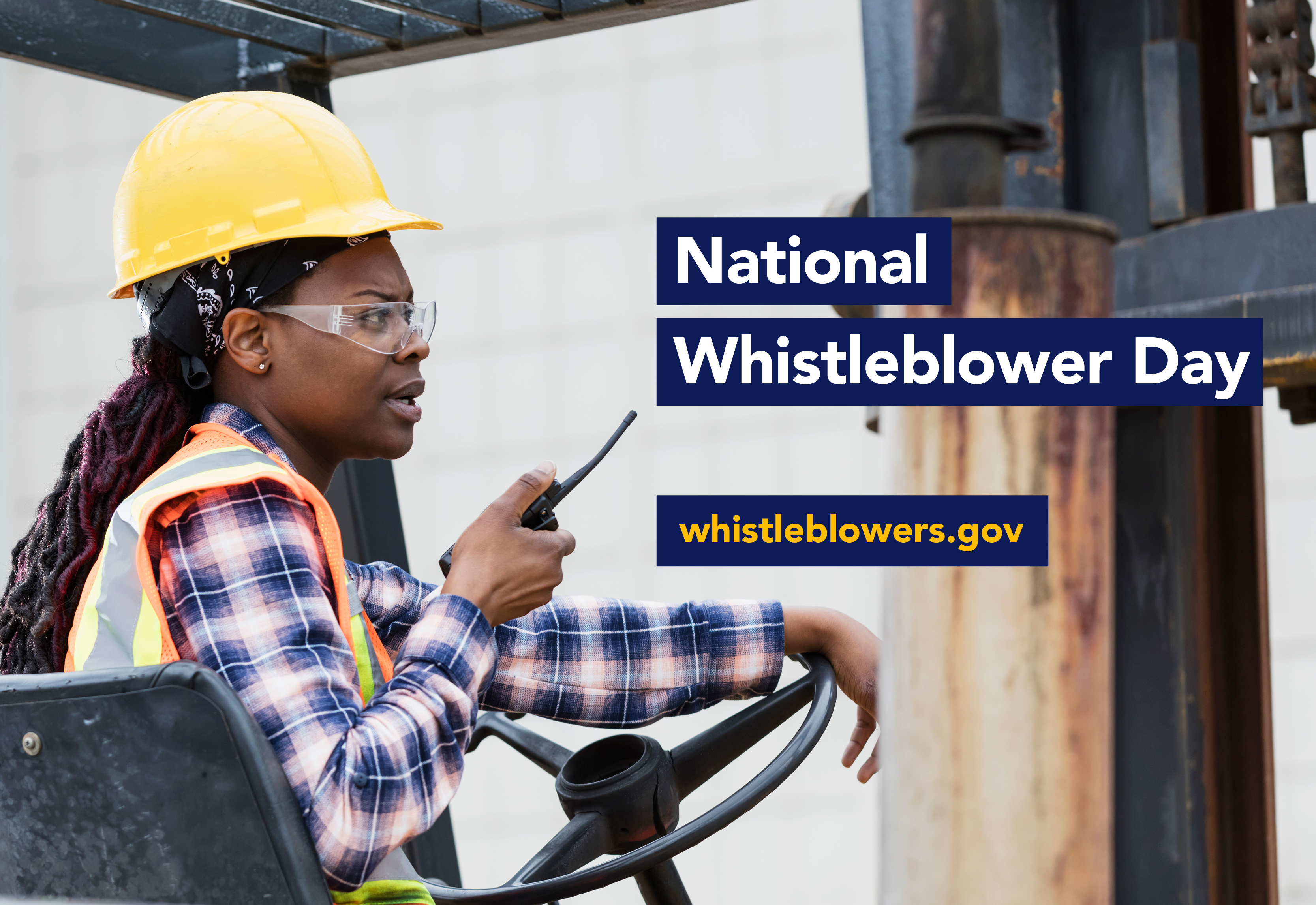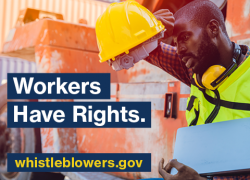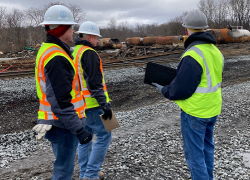En español

Whistleblowers report workplace conditions that they believe to be unsafe or illegal. They are courageous people who report what they have seen or experienced and are essential in protecting America’s workforce, like the seaman aboard the vessel Safmarine Mafadi — a 50,000-ton, 958-foot container ship — who reported a number of safety concerns to the U.S. Coast Guard in December 2020. These ranged from malfunctioning gear used to release lifeboats to a trainee being alone and unsupervised while on ship’s watch, among other issues.
The employer, Maersk Line Limited — one of the world’s leading providers of marine cargo services — responded by illegally suspending and then terminating the seaman for making the complaint. Following our investigation, the company has been ordered to reinstate the employee and pay more than $700K in back wages and damages.
As we mark National Whistleblower Day on July 30, we thank this whistleblower and the many others for their courage in speaking out, and for their contributions in ensuring safer conditions for themselves and their co-workers. Because of their actions, lives have been saved.
As important as whistleblowers are, they are only effective if they are protected from retaliation. The Department of Labor enforces whistleblower and anti-retaliation laws. Under federal law, workers have the right to raise concerns if they believe their rights are being violated in the workplace.
The Occupational Safety and Health Administration’s Whistleblower Protection Program enforces 25 statutes that protect workers. These statutes prohibit employers from retaliating against workers for reporting unsafe or illegal circumstances or activities. What is retaliation? It’s any adverse action that could discourage or deter a reasonable employee from speaking out about work conditions or employer activities.
To ensure we meet the needs of today’s workers, OSHA recently updated its whistleblower investigations manual for our staff, including clarified guidance, statute-specific chapters converted into desk aids for easier reference and more. We have also held more than 10 public meetings to get feedback on how to improve the whistleblower program. Some of the feedback we received that we're implementing included developing clear instructions on how to file whistleblower cases and updating our internal training for our inspectors to improve our processes and outreach.
Like OSHA, the department’s Mine Safety and Health Administration also provides strong protections for miners and holds mine operators responsible to improve mine safety conditions. Under the Mine Safety and Health Act, miners have the right to request a health and safety inspection, and to report unsafe working conditions.
This year we’ve seen an increase in mining fatalities and injuries, many of which resulted from unsafe acts. Miners who report unsafe conditions can prevent or reduce harm to other miners and help reduce these trends. While exercising their rights, miners are protected from retaliation for identifying hazards, asking for MSHA inspections, or refusing to engage in an unsafe activity.
Similar rights apply to pay concerns, too – if employers don’t pay workers all the wages they’ve earned, they can speak up without fear of retaliation. The department’s Wage and Hour Division enforces laws on the federal minimum wage, overtime pay, recordkeeping and child labor requirements, as well as laws about working conditions and payment for migrant and seasonal agricultural workers. The division’s retaliation regulations also protect workers who are covered by all of these laws.
The department is committed to protecting those who step forward to report their experiences in workplaces that they believe to be unsafe or illegal. Workers have the right to speak up about their work experience without fear of retaliation. Employers have the responsibility to ensure workers know that right.
We enforce the law regardless of a worker’s immigration status and can communicate with workers in many languages. Learn more about whistleblower protections and contact us with any questions at 1-866-487-2365.
Meghan Smith is a program analyst for the Occupational Safety Health Administration’s Whistleblower Protection Programs Office.
Marcus Smith is the chief of accident investigations for the Mine Safety and Health Administration’s Office of Enforcement.
Lee Ann Dunbar is the associate administrator for the Wage and Hour Division’s regional Enforcement and Support Office.
Follow @OSHA_DOL, @MSHA_DOL and @WHD_DOL on Twitter.
Equipos de protección personal: para todos y todas
Por Meghan Smith, Lee Ann Dunbar y Marcus Smith
Los denunciantes reportan condiciones laborales que consideran inseguras o ilegales. Con valentía, comunican lo que han visto o experimentado, y son esenciales para la protección de la fuerza laboral.
Tal es el caso de un trabajador de la marina mercante a bordo del portacontenedores de 50,000 toneladas y 958 pies Safmarine Mafadi, quien reportó a la Guardia Costera de EE.UU. en diciembre del 2020 una serie de problemas de seguridad a bordo como el mal funcionamiento del equipo de liberación de botes salvavidas o tener a un aprendiz haciendo la guardia del barco sólo y sin supervisión.
El empleador, Maersk Line Limited, uno de los principales proveedores de servicios de transporte marítimo, ilegalmente suspendió y despidió después al trabajador por haber reportado los problemas. Luego de nuestra investigación, a la empresa se le ha ordenado reintegrar al empleado y pagarle más de $700,000 en salarios atrasados y compensación por daños y perjuicios.
Al conmemorar el 30 de julio el Día Nacional del Denunciante, aprovechamos para expresar nuestra gratitud a este denunciante y a otros muchos otros por su valentía en hablar, y por sus contribuciones para garantizar condiciones más seguras para ellos y para sus compañeros. Sus acciones han salvado vidas.
Mas allá de su importancia intrínseca, los denunciantes son efectivos sólo si están protegidos contra represalias. El Departamento de Trabajo hace cumplir las leyes sobre denunciantes y contra represalias. Por ley federal, los trabajadores tienen derecho a elevar quejas y expresar inquietudes si creen que su seguridad y sus otros derechos en el lugar de trabajo se están violando.
El Programa de Protección de Denunciantes de la Administración de Seguridad y Salud Ocupacional hace cumplir 25 estatutos de protección a los trabajadores. Estos estatutos prohíben que los empleadores tomen represalias contra los trabajadores que denuncian actividades o condiciones inseguras o ilegales.
¿Qué es represalia? Una represalia es cualquier acción adversa que pueda desalentar o disuadir a un trabajador para hablar sensatamente sobre condiciones laborales o actividades de un empleador.
Para asegurarnos de satisfacer las necesidades de los trabajadores hoy día, OSHA actualizó recientemente el manual para nuestro personal sobre investigaciones relacionadas a denunciantes. Esta actualización incluye clarificaciones y capítulos específicos de estatutos convertidos en referencias de ayuda para su fácil manejo, entre otros asuntos. También hemos mantenido más de 10 reuniones públicas para obtener comentarios sobre cómo mejorar el programa sobre denunciantes. Algunos de los comentarios que recibimos -y que ya estamos implementando, incluyeron el desarrollo de instrucciones claras sobre cómo presentar denuncias, así como la actualización de nuestra capacitación interna para que nuestros inspectores mejoren nuestros procesos y su impacto.
Al igual que OSHA, la Administración de Seguridad y Salud Minera del departamento también brinda protecciones sólidas para los mineros, responsabilizando a los operadores de minas en mejorar las condiciones de seguridad. En virtud de la Ley de Seguridad y Salud en Minas, los mineros tienen derecho a solicitar una inspección de salud y seguridad, y a denunciar condiciones de trabajo inseguras.
Este año hemos visto un aumento en las muertes y lesiones en la minería, muchas de las cuales fueron el resultado de actos inseguros. Los mineros que reportan condiciones inseguras pueden prevenir o reducir el daño a otros mineros y ayudar a reducir estas tendencias. Mientras ejercen sus derechos, los mineros están protegidos contra represalias por identificar peligros, solicitar inspecciones de MSHA o negarse a participar en una actividad insegura.
Los mismos derechos aplican respecto a preocupaciones salariales: si empleadores no pagan todos los salarios ganados, los trabajadores pueden hablar sin temor a represalias. La División de Horas y Salarios del departamento hace cumplir las leyes sobre salario mínimo federal, pago por horas extras, mantenimiento de registros y requisitos sobre trabajo infantil, así como leyes sobre condiciones laborales y pago a trabajadores agrícolas migrantes y de temporada. Las regulaciones de la división contra represalias también protegen a los trabajadores que están cubiertos por todas estas leyes.
El departamento está comprometido a proteger a quienes dan un paso al frente para denunciar sus experiencias en lugares de trabajo considerados inseguros o que no cumplen con la ley. Los trabajadores tienen derecho a hablar sin temor a represalias. Los empleadores tienen la responsabilidad de garantizar que los trabajadores conozcan ese derecho.
Hacemos cumplir la ley independientemente del estado migratorio de un trabajador y podemos comunicarnos con los trabajadores en muchos idiomas. Obtenga más información sobre las protecciones para denunciantes y comuníquese con nosotros al 1-866-487-2365 para cualquier duda o pregunta.
Meghan Smith es analista de programas de la Oficina de Programas de Protección de Denunciantes de la Administración de Seguridad y Salud Ocupacional.
Marcus Smith es el director de investigaciones de accidentes de la Oficina de Cumplimiento de la Administración de Seguridad y Salud Minera.
Lee Ann Dunbar es la administradora asociada de la Oficina regional de Cumplimiento y Apoyo de la División de Horas y Salarios.
Siga a @OSHA_DOL, @MSHA_DOL y @WHD_DOL en Twitter.

 U.S. Department of Labor Blog
U.S. Department of Labor Blog



